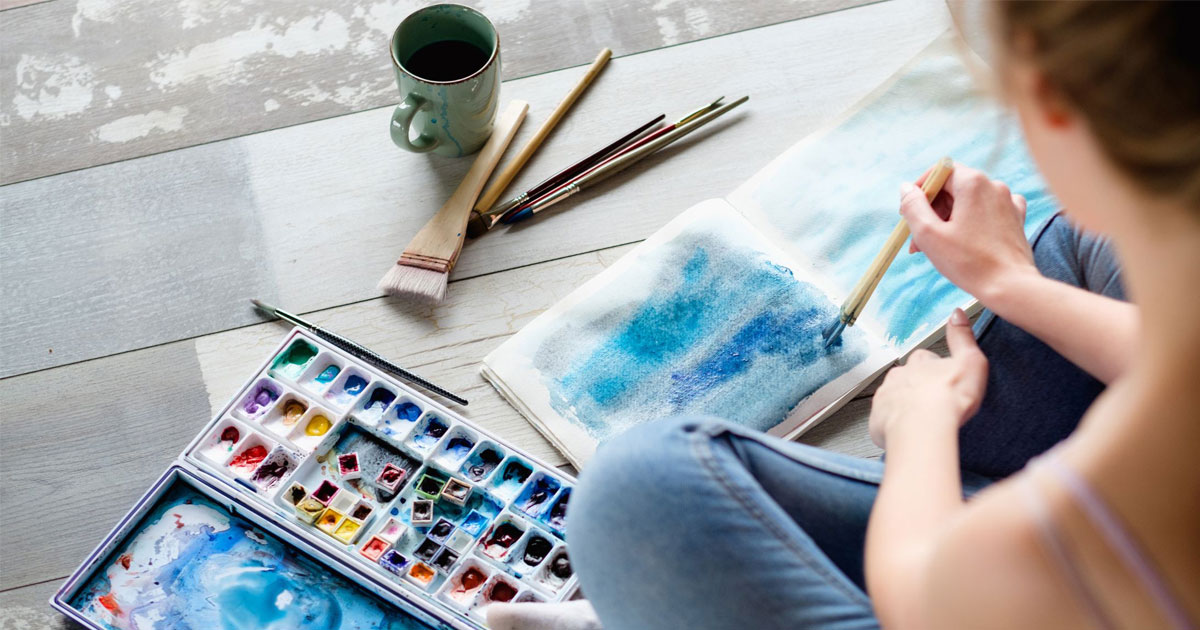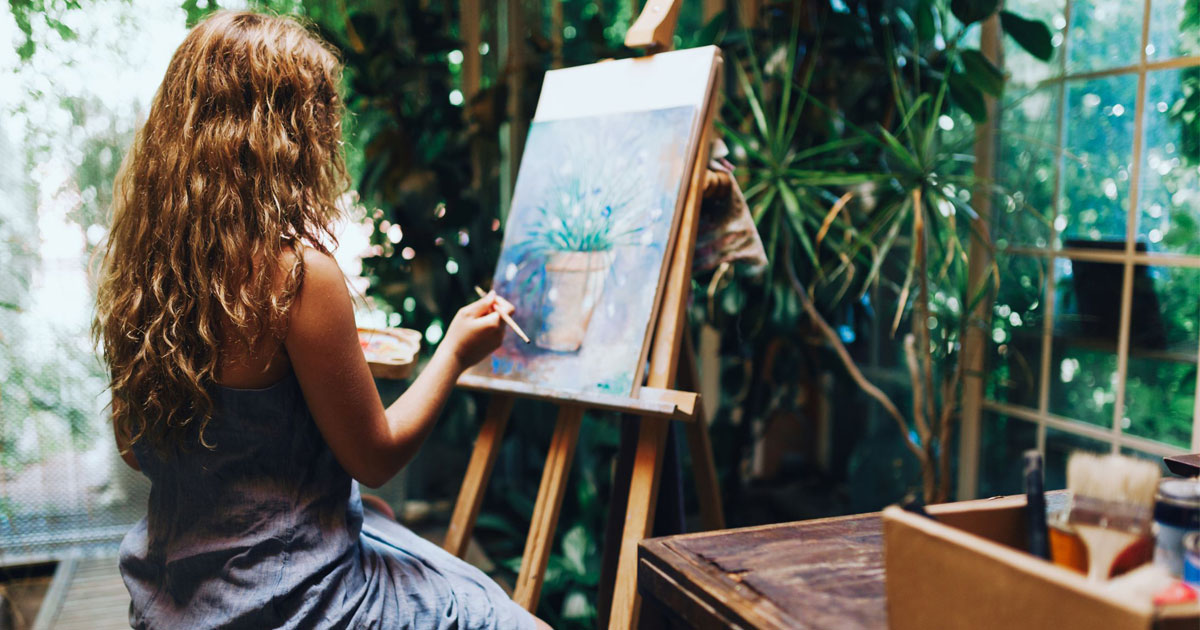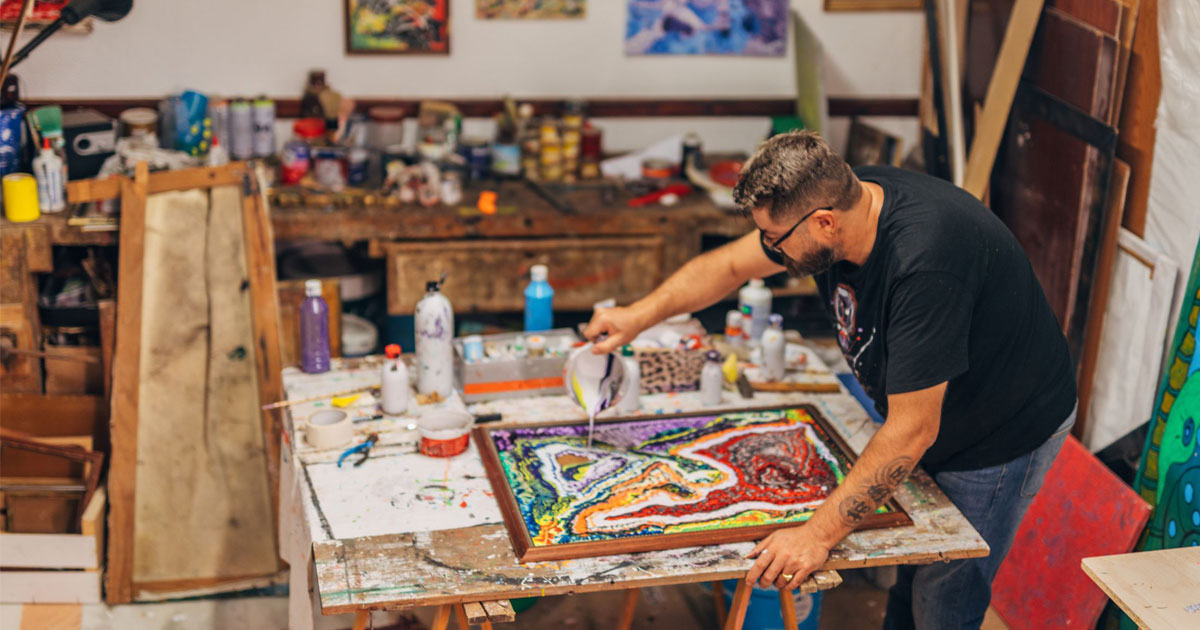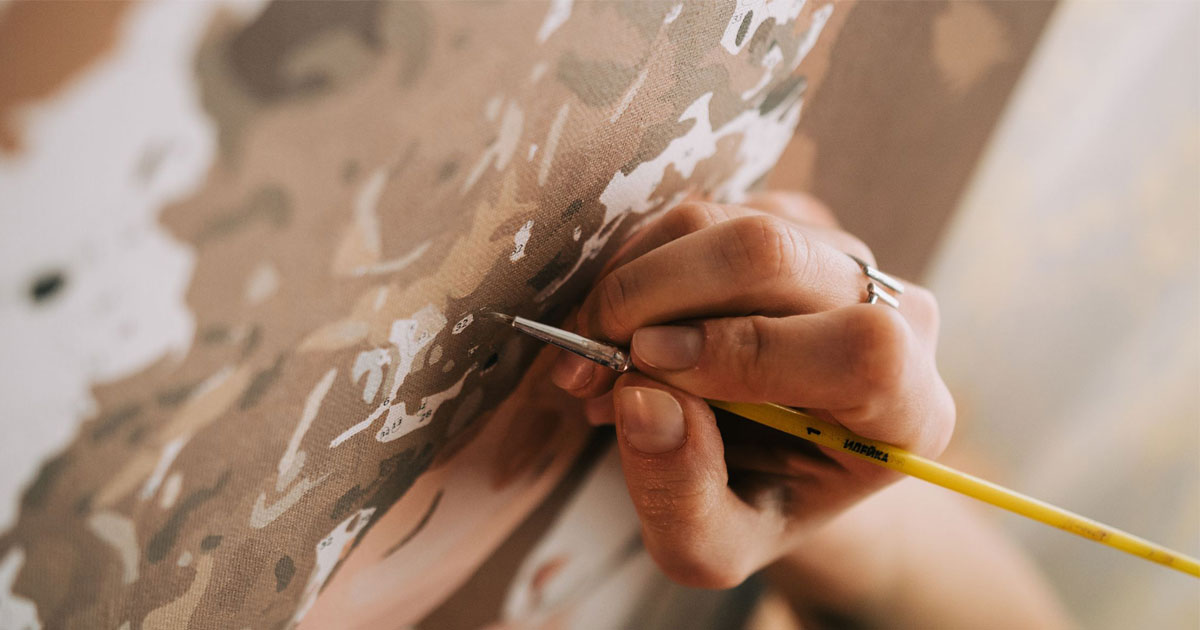Painting can be a fantastic way to help yourself develop an inner focus—in fact, people often find they lose track of time because they become completely immersed in the painting process.
Painting as a Form of Meditation
Meditating through art is a real and powerful method of practicing meditation. In fact, meditation through artistic endeavors can come in a variety of forms, and painting is just one of them. Painting in and of itself is a process that slows down the mind and body, helping you transport yourself to a place of peace and stability. It takes your mind away from the anxious, repetitive thoughts that you might have and focuses your energy into something much more calming.
If you’re like many people in recovery, it can feel impossible to turn off your anxious and repetitive thoughts. While painting, many people find that the mind slowly quiets as they lose themselves in the calming process. This inspires a state of relaxation and meditation, often without the painter realizing what’s occurring.
How Do You Meditate While Painting?

Meditative painting can be achieved.
To get started:
Focus Your Energy
One of the most important aspects of meditation involves focusing your energy into one area, so that you can then release it and achieve a clear mind. Consider how stressful life can be on a daily basis. It can be all too easy to let your mind run wild with anxious thoughts without becoming aware of how stressed you truly are.
With painting, you can focus your energy and anxious thoughts on the piece in front of you and use it as an outlet for those feelings. This helps to keep away stray intrusive thoughts and allows you to take a moment to calm down and be at peace with yourself. By focusing your energy into one place and working through obstacles through painting, you are meditating.
Slow Down and Find Peace
Slowing down can be difficult for anyone in our busy society. Whether it’s your busy schedule or the pressure that feeling unproductive can put on you, it can be hard to take time to relax. Painting can not only help you take some much-needed time for yourself, but it is an affordable, easy, and fun hobby.
It’s also a practice that helps people with restless minds finally find some peace and slow down enough to reach a meditative state. This ability to slow down and stop overthinking during meditation is a crucial tool to have while you recover. It’s one of many mindfulness techniques.
Clear Your Mind
Painting allows people to clear their minds, many times without even realizing it. This occurs because people often get into what is known as a “flow.” “Flowing” is a term used to describe becoming fully immersed in an activity, to the point where you feel almost mesmerized. This flow is what helps make painting a form of meditation, as some people really struggle to fully immerse themselves and clear their minds from their current thoughts. Actively clearing your mind before beginning can help ensure you find your flow.
The Benefits of Meditation During Recovery
Meditation is a frequently cited recovery tool for a reason—it can not only help you work your way through SUD treatment, but it can also help reduce your risk of relapse. In fact, meditation has many benefits for those in recovery.
Painting Provides a Healthy Coping Mechanism
Building healthy coping mechanisms is an essential aspect of recovery. When you get overwhelmed, it can seem far too easy to resort back to old methods that may have led to your substance use in the first place. Developing healthy coping mechanisms instead, including meditation through painting, can help you fight urges to relapse as well as help you calm down during anxious times.
Painting is Both a Hobby and a Form of Self Care

Self-care is another vital part of your journey to recovery. Simple things like eating healthy, getting enough sleep, and investing time in activities that make you happy are all forms of self-care that can help you heal. Painting is something anyone can do, which is why it makes such a great form of self-care for anyone who needs to spend more time on themselves, including those in recovery.
Hobbies are important too, not only because they are a form of self-care, but because they can take your focus away from stressors and put it into something you care about. Painting and meditating are just a few of the ways you can take care of yourself during recovery.
Painting Can Help Increase Self-Awareness
Building self-awareness can be a difficult skill to master. This is because it involves recognizing various aspects of your thoughts, feelings, behaviors, and other features of the self. Self-awareness is important during recovery because it helps you to evaluate how you’re feeling and why you’re feeling that way. By being self-aware, you take the time to process your feelings and thoughts instead of acting on them immediately. Painting can help you meditate and spend time with yourself, and as a result, you can strengthen your self-awareness skills.
Painting Is a Stress and Anxiety Reliever
Painting is also an amazing stress and anxiety reliever. It’s a hobby that requires no skill and allows you to build a flow with the paint and the canvas or paper. As mentioned, flowing is what makes painting such a great stress and anxiety reliever—this feeling of being in flow with your work can help take you away from even the most stressful of thoughts. Painting is also an activity that doesn’t require a great deal of physical or mental work unless you really want it to, so you can easily paint at times when you’re feeling stressed or anxious.
Painting Reduces Burnout
Burnout is the result of feeling overwhelmed, overworked, and stressed. Burnout can happen both before and during recovery, which is why it’s so important to practice self-care. Whether you’re overwhelmed from work, recovery, or life in general, having an outlet to relieve your stress, utilize a healthy coping strategy, and deal with your feelings can help you immensely.
This is why so many people are turning to painting. Sometimes, to prevent burnout, all you need is some time to let your mind become free. Painting helps you focus your energy and calm you down without tiring you out or making you feel worse.
Embrace Art as a Form of Meditation in Recovery

Recovery can be difficult to say the least, and finding healthy coping mechanisms, activities, and stress-relievers is essential throughout the process. Art is an incredible tool that can help you in many ways. Whether you just began your journey to recovery or you have been in recovery for years, painting can serve as a form of self-care and an outlet for meditation. Show your support of the arts and recovery by reading our Art in Recovery series.
Sources:
https://www.ncbi.nlm.nih.gov/pmc/articles/PMC6247953/
Jenny Weatherall is the co-owner and CEO of Eminent SEO, a design and marketing agency founded in 2009. She has worked in the industry since 2005, when she fell in love with digital marketing… and her now husband and partner, Chris. Together they have 6 children and 3 granddaughters.
Jenny has a passion for learning and sharing what she learns. She has researched, written and published hundreds of articles on a wide variety of topics, including: SEO, design, marketing, ethics, business management, sustainability, inclusion, behavioral health, wellness and work-life balance.


